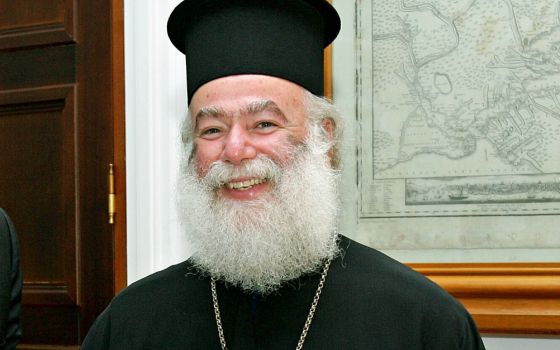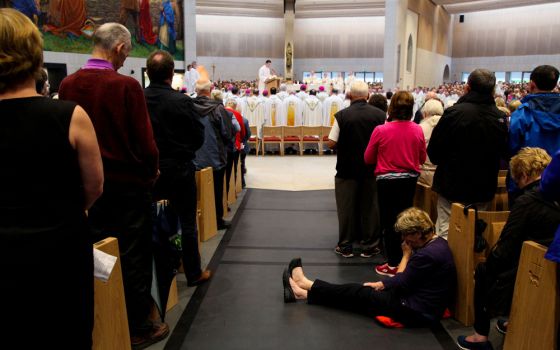Pope Francis has created a commission to study the possibility of allowing women to serve as deacons in the Catholic church, following up on a promise made last May in what could be an historic move towards ending the global institution's practice of an all-male clergy.
The pontiff has appointed an equal number of male and female experts as members of the commission, which will be led by Archbishop Luis Francisco Ladaria, a Jesuit who serves as the second-in-command of the Vatican's doctrinal congregation.
The Vatican said in a release announcing the commission Tuesday that the pope had decided to create the group “after intense prayer and mature reflection” and wanted it particularly to study the history of the female diaconate “in the earliest times of the church.”
The formal name given to the group is "Study Commission on the Women’s Diaconate." The commission’s members include experts in patristic theology, ecclesiology, and spirituality.
Among noted names are: Franciscan Sr. Mary Melone, who heads Rome’s Pontifical University Antonianum, and Phyllis Zagano, a senior research associate-in-residence at Hofstra University in New York who is also an NCR columnist.
Included in the group are six faculty members of pontifical universities, four members of the Vatican’s International Theological Commission, and one member of the Pontifical Biblical Commission.
Among the members are six priests, four laywomen, and two women religious.
As reported first by NCR, Francis promised to create the commission during a meeting at the Vatican in May with some 900 leaders of the world’s congregations of Catholic women religious, who were in Rome for the triennial meeting of the International Union of Superiors General (UISG).
During a question and answer session with the pontiff May 12, the women told Francis that women had served as deacons in the early church and asked: "Why not construct an official commission that might study the question?"
"I am in agreement," the pontiff replied. "I will speak to do something like this."
Later, during a press conference with journalists in June, the pope said he had asked both Cardinal Gerhard Muller, head of the doctrinal congregation, and Sr. Carmen Sammut, the UISG president, to make a list of people he might consider for the group.
Francis' openness to studying the possibility of women serving as deacons could represent an historic shift for the global Catholic church, which does not ordain women as clergy.
Pope John Paul II said in his 1994 apostolic letter Ordinatio Sacerdotalis that "the Church has no authority whatsoever" to ordain woman as priests, citing Jesus' choosing of only men to serve as his twelve apostles.
Many church historians have said however that there is abundant evidence that women served as deacons in the early centuries of the church. The apostle Paul mentions such a woman, Phoebe, in his letter to the Romans.
In the modern day, the Catholic church reinstituted the role of the permanent deacon following the reforms of the landmark 1962-65 Second Vatican Council. The role is generally open to married men who have reached the age of 35.
Such men are ordained, similar to priests, but can only conduct certain ministries in the church.
While they cannot celebrate the Mass, they frequently lead prayer services, offer the sacrament of baptism, and even manage parishes as pastoral administrators in the absence of priests.
The full list of members of the new commission:
- Archbishop Luis Francisco Ladaria, secretary of the Vatican’s Congregation for the Doctrine of the Faith, serving as president;
- Holy Family Sr. Nuria Calduch-Benages, member of the Pontifical Biblical Commission;
- Francesca Cocchini, faculty member at Rome’s La Sapienza University and the Patristic Institute Augustinianum;
- Msgr. Piero Coda, president of Rome’s Sophia University Institute and member of the International Theological Commission;
- Augustinian Fr. Robert Dodaro, president of the Patristic Institute Augustinianum;
- Jesuit Fr. Santiago Madrigal, ecclesiologist at Madrid’s Pontifical University Comillas;
- Franciscan Sr. Mary Melone, the first female president of Rome’s Pontifical University Antonianum;
- Fr. Karl-Heinz Menke, emeritus professor of dogmatic theology at Germany’s University of Bonn and member of the International Theological Commission;
- Salesian Fr. Aimable Musoni, ecclesiologist at Rome’s Salesian Pontifical University;
- Jesuit Fr. Bernard Pottier, faculty member at Brussels’ Institute D'etudes Théologiques and member of the International Theological Commission;
- Marianne Schlosser, theologian at the University of Vienna and member of the International Theological Commission;
- Michelina Tenace, theologian at Rome’s Pontifical Gregorian University;
- Phyllis Zagano, senior research associate-in-residence at Hofstra University in New York.
Zagano said in a brief interview with NCR Tuesday afternoon that creation of the commission was a "wonderful opportunity for the church as a whole to look at the question of restoring women to the diaconate."
"I think the most important thing is that the Holy Father on behalf of the church may make a decision one way or the other about whether women can be returned to the ordained diaconate," she said.
The academic, who authored Women Deacons: Past, Present, Future with Gary Macy and Deacon William Ditewig in 2011, said she hoped the commission "will have an open and honest scholarly discussion about the history of women in the diaconate, about the possibilities for restoring women to it."
"The previous discussion -- the only modern discussion -- was the study document made by the International Theological Commission in 2002 that left the question open," she said. "If this is an opportunity for the Holy Father to make a decision one way or the other, I think it's a hopeful sign."
One U.S. bishop praised the news of the formation of the commission in a press release Tuesday afternoon. Chicago Archbishop Blase Cupich, who Francis recently appointed to the Vatican's Congregation for Bishops, said he welcomed the move.
"From the earliest days of the church, women rightly served in key leadership roles," said Cupich. "Still, the church must do better. Women deserve to be brought more fully into the decision-making of the church."
"I look forward to learning more about the work of the commission ... as [the members] bring their considerable talents to bear on this important subject in the life of the church," said the archbishop.
Story updated at 1:36 p.m. CT, August 2.
[Joshua J. McElwee is NCR Vatican correspondent. His email address is jmcelwee@ncronline.org. Follow him on Twitter: @joshjmac.]


